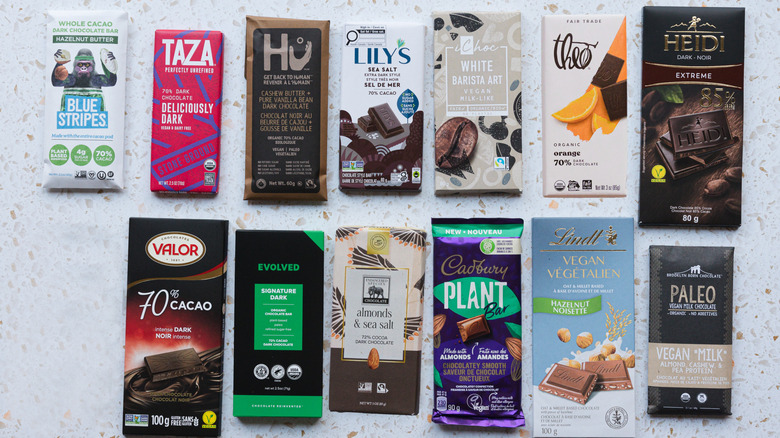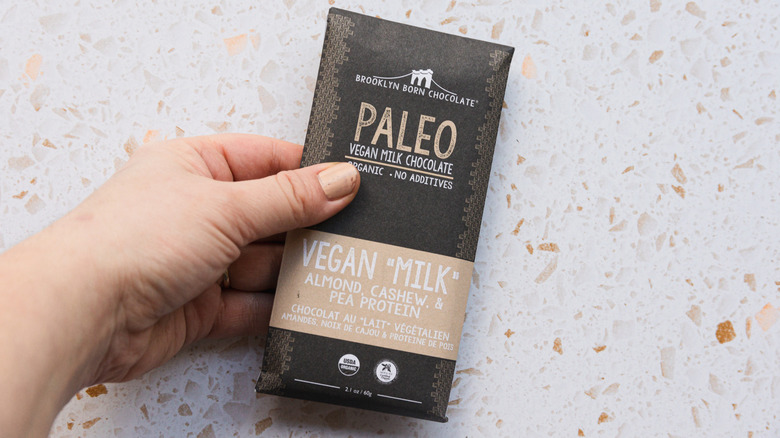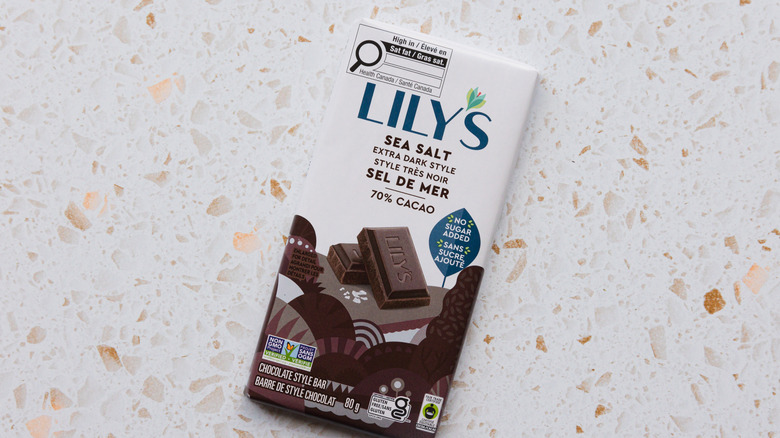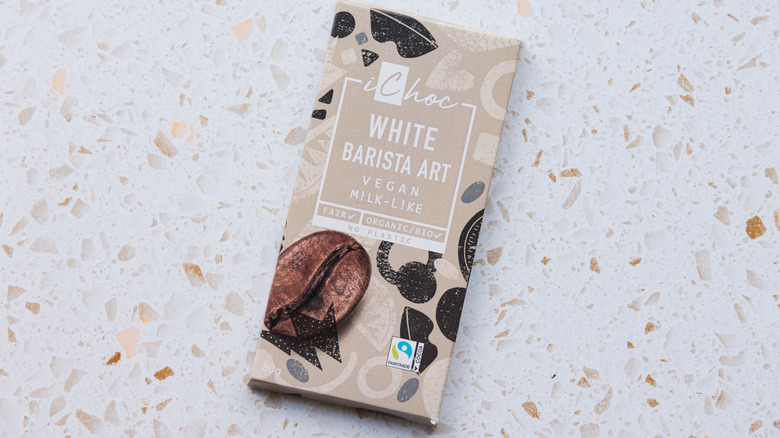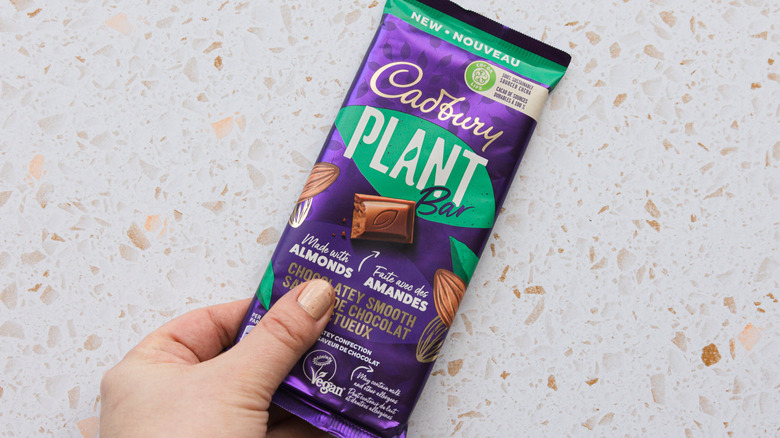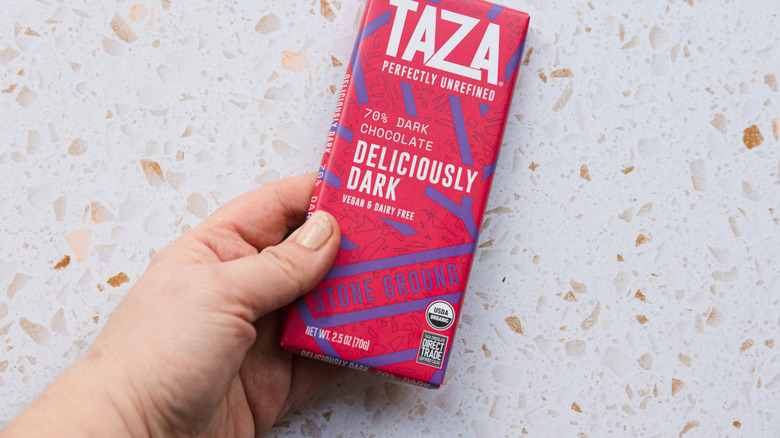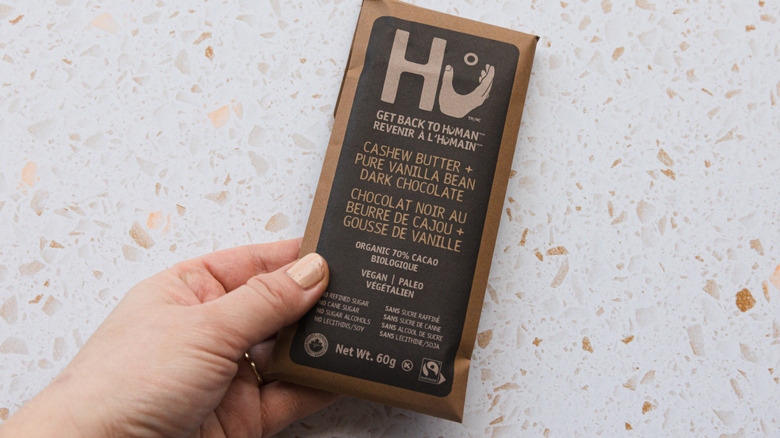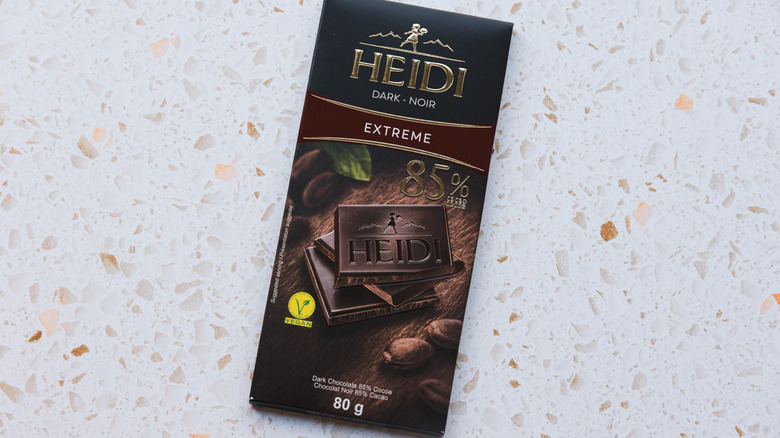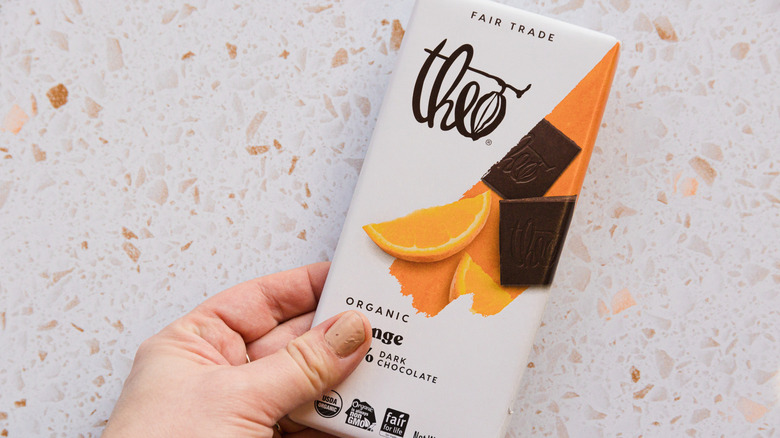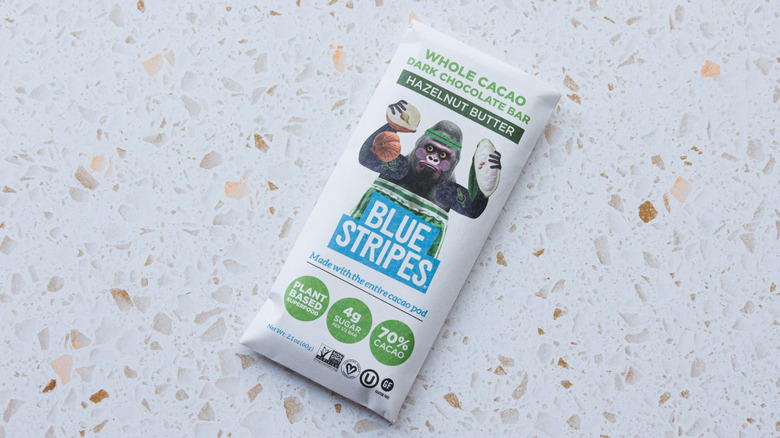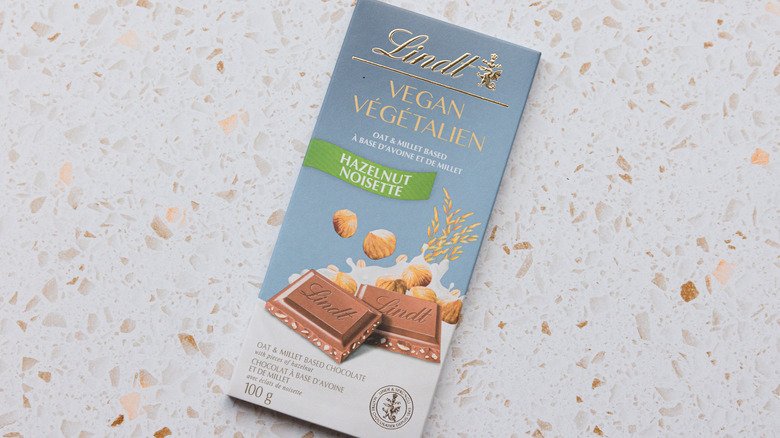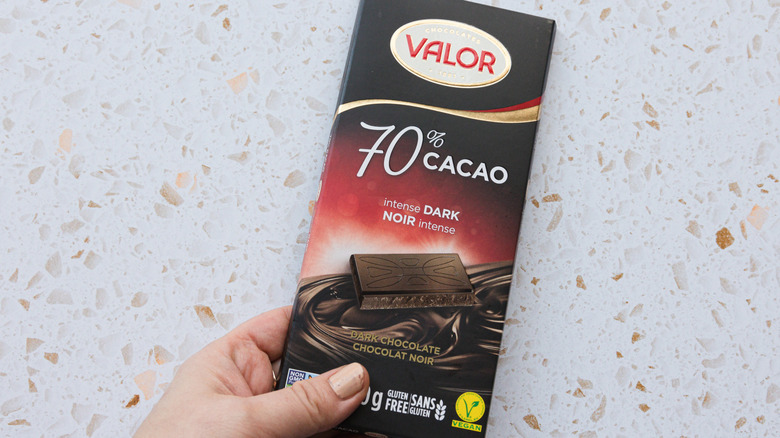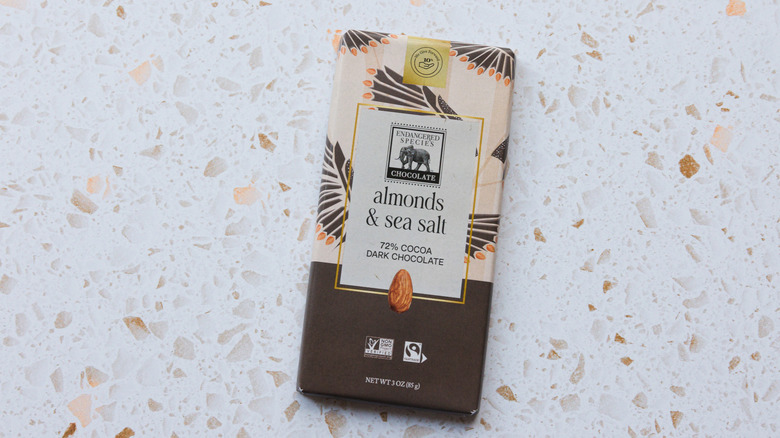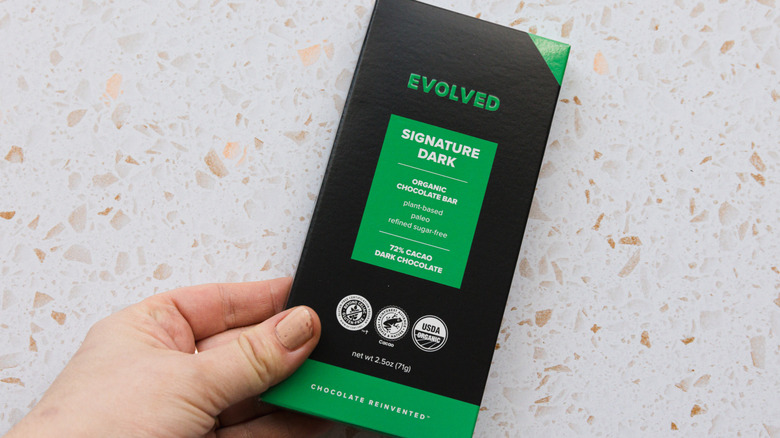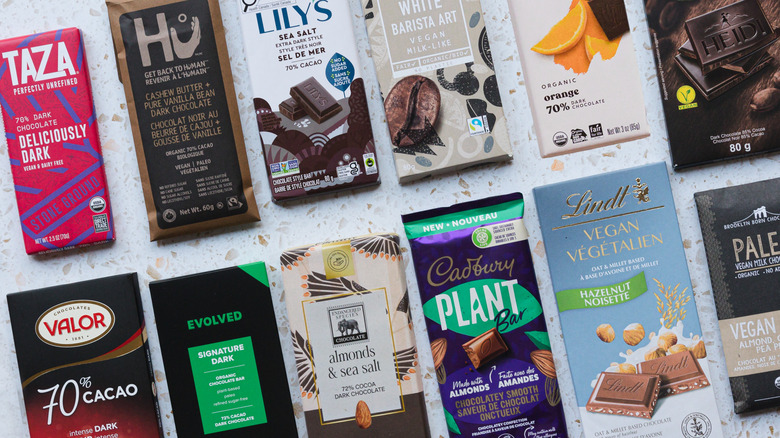13 Vegan Chocolate Bars Ranked From Worst To Best
If you're a chocolate lover trying to lead a vegan lifestyle, you know the struggle to find dairy-free dessert options that satisfy your sweet tooth. The problem is worse with chocolate. You want something that's going to hit just that right balance between sinful and virtuous, but also doesn't harm the environment or the people who make a living off it.
But finding that proverbial needle in a haystack is sometimes harder than actually making chocolate. Luckily, vegan chocolate bars have come a long way in recent years, with more brands offering plant-based alternatives that rival their milk chocolate counterparts. With more than 15 years under my belt as a lactose intolerant, on-again-off-again plant-forward eater, I've had my fair share of good and bad chocolate, and committed to sifting through the myriad of options in the store to choose some favorites.
But what makes candy, like a chocolate bar, vegan? Typically, it's the absence of milk products and the use of alternative ingredients like coconut milk, rice milk, or simply a higher percentage of cocoa. When shopping for vegan chocolate, check the ingredient list for any hidden animal products and watch out for additives like milk fat, whey, or casein. If you have soy allergies, soy lecithin is another thing to avoid, while stevia can give bars a strange taste. To help you navigate the world of vegan chocolate, here are 13 popular vegan bars ranked from worst to best.
13. Brooklyn Born Chocolate paleo vegan milk chocolate
Brooklyn Born Chocolate was founded in 2005 as a private-label confectionery manufacturer. The brand has a rich history of developing partnerships with Fortune 100 companies, luxury hotels, and gourmet markets in New York City, and has built a reputation for using fine, all-natural ingredients and creating unique flavor combinations. However, their Paleo Vegan Milk Chocolate bar, made with almond, cashew, and pea protein, falls short of the quality one might expect from this established brand. It was our least favorite of the bunch.
Despite the company's commitment to excellence and innovative approaches, this particular product misses the mark. The chocolate bar is disappointingly bland, with a stevia-like sweetness that overpowers any nuanced flavors. The texture is starchy and earthy, reminiscent of a childhood hot chocolate mix rather than a premium chocolate experience. While the attempt to cater to the vegan and paleo markets aligns with the brand's commitment to sustainability and adaptable business model, the execution of this chocolate bar fails to live up to the brand's claims for quality and taste innovation.
12. Lily's sea salt extra dark style chocolate
Lily's sea salt extra dark style chocolate, produced by a company famed for its no-added-sugar approach, ranks 12th on our list. Founded by Cynthia Tice in 2010, Lily's emerged from a personal quest to create chocolate without refined sugars. The brand prides itself on using non-GMO, gluten-free ingredients and fair trade cocoa. Notably, Lily's products avoid maltitol, maltodextrin, and dextrose, which are high glycemic index sweeteners often found in sugar-free products. Instead, they use alternative sweeteners and dextrin fiber.
However, perhaps because of this distinct lack of unadulterated sugar, this particular chocolate bar disappoints. We are actually big fans of the sweet-and-salty flavor combination, as a touch of sea salt can really transform cookies, chocolate-covered caramels, and other confections, such as chocolate truffles. But in this chocolate, the overwhelming saltiness dominates the flavor profile, making it difficult to enjoy more than a small piece, and masks any nuanced chocolate flavors one might expect from an extra dark style chocolate. While there's a pleasant melting effect towards the end, it's preceded by an initial graininess.
While the issues we found with this chocolate may be a result of the particular flavor we tried, the excessive saltiness made it hard to gauge its thoughtfully chosen ingredients, and the texture's overall graininess was also distinctly off-putting.
11. iChoc white barista art vegan milk-like chocolate
iChoc's white barista art vegan milk-like chocolate comes from a German brand specializing in vegan, organic, and fair trade chocolate production. iChoc has an extensive line of all manner of vegan chocolates, earning numerous awards for its efforts.
The white chocolate-like bar with crushed bits of coffee beans presents a mixed experience, despite our excitement about it. Visually, it resembles a cookies-and-cream chocolate, reminiscent of Hershey's popular flavor. But the similarity ends there. The dominant flavor here is decidedly coffee, with an intense, punchy presence that overshadows any chocolate notes. This strong coffee taste disappoints those expecting the sweet taste of white chocolate.
Texturally, the bar performs well, offering a satisfying mouthfeel that reflects the high cocoa butter quotient in white chocolate. However, a noticeable bitterness and a Stevia-like aftertaste detract from the overall enjoyment. The chocolate does reveal more nuanced flavors when allowed to melt slowly in the mouth, suggesting that patience can enhance the tasting experience.
10. Cadbury plant bar
Cadbury, a household name in chocolate production, ventured into the vegan market with their plant bar, which ranks 10th on our list. This offering from the iconic British confectionery company represents a significant step in mainstream chocolate brands addressing the growing demand for plant-based alternatives, which is a win in our books.
The Cadbury Plant Bar attempts to replicate the creamy texture and sweet flavor profile of their popular milk chocolate bars using almond paste instead of dairy. However, the result is a mixed bag of successes and shortcomings. The chocolate does manage to capture some of the familiar Cadbury sweetness, which likely contributes to its appeal among younger consumers.
However, for more discerning palates, the plant bar falls short of expectations. The chocolate is noticeably high in sugar, which may be an attempt to mask the absence of milk but results in an overly sweet taste. The "milkiness" derived from the almond paste feels somewhat artificial, lacking the smooth, creamy mouthfeel associated with traditional milk chocolate. Perhaps the most disappointing aspect is the bitter aftertaste, reminiscent of sugar substitutes, which detracts from the overall experience. This lingering bitterness is a common challenge in vegan chocolate production and suggests that Cadbury's formula may still need some refinement.
9. Taza deliciously dark chocolate
Taza Chocolate is a brand with a unique approach to chocolate making. Founded in 2005 by Alex Whitmore in Somerville, MA, Taza specializes in stone ground chocolate, a method inspired by traditional Mexican chocolate-making techniques. The company prides itself on minimal processing, allowing the complex flavors of the cacao to shine through, and is a pioneer in ethical cacao sourcing with its Direct Trade Cacao Certification program.
The dark chocolate bar offers a distinctive and polarizing experience. The initial taste is startlingly intense, described by some as almost unpleasant. There's a noticeable graininess to the texture, which is intentional due to the stone grinding process but can be off-putting at first. It does tend to grow on you over time, becoming a unique aspect of the Taza experience.
The flavor profile is strongly reminiscent of Mexican chocolate, just as the brand intended. Interestingly, the taste is remarkably close to that of a raw cocoa bean, offering chocolate enthusiasts a chance to experience something close to the source. This unrefined, bold flavor is a testament to Taza's commitment to minimally processed chocolate. While the initial taste and texture might be challenging for those accustomed to smoother, more refined chocolates, Taza's dark chocolate bar offers an authentic and unique tasting experience that will be appreciated by those seeking a more rustic, intense chocolate flavor. It would do really well in hot chocolate recipes.
8. Hu cashew butter pure vanilla bean dark chocolate
Hu's cashew butter + pure vanilla bean dark chocolate comes from a brand with a compelling origin story. Founded in 2012 by siblings Jordan Brown, Jason Karp, and Jessica Karp, Hu — short for human — began as a paleo-inspired restaurant in New York City before evolving into a chocolate line. The brand's philosophy centers on uniting simple ingredients with unbeatable taste, and avoiding ingredients that sound like a chemistry class rather than a recipe.
The texture of this particular bar is notably pleasant, striking a balance between the smoothness of dark chocolate and the creaminess imparted by the cashew butter. This textural element sets it apart from traditional dark chocolates, providing a more indulgent mouthfeel.
The flavor profile is complex and somewhat divisive. Initially, the chocolate presents as quite bitter. However, this bitterness is balanced by a subtle creaminess that develops as the chocolate melts, likely due to the cashew butter inclusion. The vanilla bean adds a delicate aromatic note, though it's not overpowering. Interestingly, while the texture of the cashew butter is appreciated, its taste didn't universally appeal to our tasters. However, with simple ingredients and a unique flavor combination, this bar is a noteworthy option in the vegan chocolate market, even if it doesn't quite hit the mark for everyone's palate.
7. Heidi extra dark chocolate
Coming in seventh place on our list is Heidi's extreme dark chocolate, a product of a Swiss chocolate company with over 25 years of history. The brand was founded by a Swiss chocolatier who aimed to pass on the secret art of chocolate making.
This extreme dark offering demonstrates the brand's expertise in creating well-balanced dark chocolate. Despite its high 85% cocoa content, this chocolate manages to strike a surprisingly mellow profile. The bitterness, often a dominant characteristic in high-percentage dark chocolates, is notably toned down, making it more approachable than many of its competitors in this category.
Texturally, the chocolate performs well. It has none of the graininess that can sometimes plague dark chocolates, suggesting a thorough conching process. The mouthfeel is smooth and mellow, with a pleasant sour aftertaste that reflects the lower cocoa butter content. The chocolate melts in the mouth if you let it sit there, which is just what you want from a good dark bar. What set this chocolate bar apart is that it delivered the intensity expected from an extreme dark chocolate while maintaining a smooth texture and a very pleasant flavor profile. This balance showcases the skill of the chocolatiers at Heidi, living up to the brand's promise of creating "visibly delicious combinations."
6. Theo orange dark chocolate
Theo's orange dark chocolate comes from a company founded in 2005 in Seattle by Joe Whinney and Jeff Fairhall with a strong commitment to ethical and sustainable chocolate production. This bar truly exemplifies Theo's dedication to quality ingredients and bold flavors.
The chocolate offers a pleasant tasting experience with a surprisingly mellow flavor profile for dark chocolate. The orange flavor, while present, is subtler than expected, allowing the chocolate notes to dominate. This balance makes it accessible to a wider range of people, avoiding the intense bitterness often associated with dark chocolates. Texturally, the bar has less "meltiness" than some competitors, suggesting a lower cocoa butter content. However, this firmer texture contributes to a prolonged, enjoyable taste experience.
Overall, Theo's orange dark chocolate offers a refined, enjoyable experience that balances flavor complexity with approachability. In other words, it's nice to eat a vegan dark chocolate that doesn't feel like you're getting punched in the mouth.
5. Blue Stripes hazelnut butter whole cacao dark chocolate bar
Ranking fifth is Blue Stripes' hazelnut butter whole cacao dark chocolate bar, which has an intriguing backstory. Founded by Oded Brenner, formerly of the Max Brenner chocolate empire, Blue Stripes focuses on upcycling the entire cacao pod, addressing the waste prevalent in the chocolate industry.
This bar stands out as the most unique in our selection. The hazelnut butter adds a compelling nuttiness and toastiness that goes beyond typical nut inclusions like almonds. The creaminess is notable and enjoyable, complementing the dark chocolate base well. At 70% cacao, the bar maintains a bitter profile characteristic of dark chocolate, but it's balanced by the nutty elements. While not sweet, the complexity of flavors makes it interesting and satisfying. The bitterness, a common thread in many vegan chocolates we've tasted, is present but not overwhelming in this case.
Aesthetically, the bar impresses with its logo imprinted on each piece, showcasing attention to detail. The overall experience reflects Brenner's extensive chocolate-making expertise, resulting in a sophisticated and well-crafted product. It's also interesting to think that the entire cocoa pod was used in making this chocolate.
4. Lindt hazelnut oat & millet based chocolate
Lindt's hazelnut oat & millet based chocolate, represents a significant entry into the vegan chocolate market from one of the world's most recognized chocolate brands. Known for its expertise in creating smooth, luxurious chocolates, Lindt has applied its skills to crafting a plant-based alternative that aims to replicate the beloved milk chocolate experience — and largely succeeds.
This bar stands out for its mellow, milky profile, a rarity in the vegan chocolate world dominated by dark, often bitter offerings. The use of oat and millet as dairy alternatives contributes to a softer, creamier texture that closely mimics traditional milk chocolate. While some of our tasters found the color a bit pale or "anemic" compared to dairy milk chocolate, the overall effect is quite successful in replicating the milk chocolate experience for vegan consumers.
The star of the show here is the inclusion of hazelnuts, which adds a pleasant dimension to the bar. The nuts are well-distributed in small pieces, providing a pleasant crunch and toasty flavor that complements the chocolate's sweetness. The size of the nut pieces is also perfectly calculated, as you'd expect from the master chocolatiers at Lindt, offering texture without overwhelming the chocolate base. This Lindt offering successfully bridges the gap between traditional milk chocolate and vegan alternatives, making it likely to be a crowd-pleaser.
3. Valor intense dark chocolate
Valor's intense dark chocolate, ranking third on our list, comes from a Spanish brand with a rich history dating back to 1881. This classic dark chocolate bar has all the flavor, texture, and bitterness you'd expect from a 70% cacao bar.
The chocolate offers a "normal" dark chocolate experience, which, in this context, is a compliment. It is notable for its excellent meltiness, which leaves you with a smooth and luxurious mouthfeel that chocolate connoisseurs will appreciate. The flavor profile strikes a well-balanced note — while it does have the characteristic bitterness of dark chocolate, it's not overwhelming, and there's a pleasant level of sweetness that makes it more accessible.
This Valor offering was deemed the best easy-tasting dark chocolate among those tested. Its success lies in its ability to deliver a classic dark chocolate experience without any gimmicks or added flavors. This is a straightforward, high-quality dark chocolate that embodies the essence of what good dark chocolate should be.
2. Endangered Species Almonds & Sea Salt Chocolate
Endangered Species' Almonds & Sea Salt Chocolate comes from an American brand known for its ethical practices and conservation efforts. Based in Indianapolis, Endangered Species Chocolate donates 10% of its net profits to wildlife conservation, adding a feel-good factor to its products.
This particular bar stands out for its well-balanced flavor. It successfully combines sweetness with saltiness, creating a satisfying taste that doesn't lean too heavily in either direction. The addition of almonds provides a nice crunch and nuttiness that complements the chocolate base well.
Texturally, this chocolate impresses with its creaminess, while still maintaining just the right amount of graininess and crunchiness from the almonds and sea salt. This combination of textures adds depth to the whole experience and keeps it interesting. One of the most appealing aspects of this chocolate is its guilt-free nature. Somehow, this chocolate tastes virtuous, not too sweet and not too bitter. Plus, consumers can feel good about supporting a company with a strong ethical stance. And in the dark world of cocoa production, that's not a small feat.
1. Evolved signature dark chocolate
Topping our list at No. 1 is Evolved's signature dark chocolate, representing a brand that has been reinventing chocolate since 2012. Founded by Christine Cusano and Rick Gusmano, Evolved focuses on creating delicious chocolate in popular flavors using high-quality, derivative-free ingredients.
This signature dark chocolate bar stands out for its exceptional balance. Despite initial concerns about it being overly health-focused, it delivers a fuss-free and enjoyable dark chocolate experience. The bar achieves a remarkable equilibrium between bitterness and sweetness, avoiding the extremes that can sometimes characterize dark chocolate. According to our taste testers, one of the most often-noted aspects of this chocolate is its creaminess. It offers a smooth, luxurious texture that simply melts in your mouth. This texture, combined with the well-balanced flavor, creates a chocolate that's approachable for a wide range of palates.
Evolved's commitment to quality ingredients and ethical sourcing adds feel-good value to the product. Overall, Evolved's signature dark chocolate earns its top spot by delivering a premium chocolate experience that doesn't sacrifice taste for health benefits. It proves that a bar of chocolate can be both wholesome and indulgent, appealing to health-conscious consumers and chocolate lovers simply trying to get by on a vegan diet in this cruel, mediocre chocolate-filled world.
Methodology
For our vegan chocolate taste test, we assembled a panel of five adults and three children. We had chocolate lovers and people who were neutral about it, including one vegan. We tasted all the chocolates in one sitting, using water as a palate cleanser between samples to ensure fair comparisons. Our selection included both popular and lesser-known brands, all readily available across the United States and explicitly labeled as vegan.
We encouraged our tasters to consider various aspects of each chocolate, including flavor, texture, and overall enjoyment. Having both adult and child testers provided insights into how these chocolates might appeal to different age groups and preferences.
During the tasting, we focused on the complete experience of each chocolate, noting things like creaminess, bitterness, sweetness, and any unique features. We aimed to capture not just individual favorites, but to identify chocolates with broad appeal and high overall quality. We hope we succeeded in creating a comprehensive guide that will be useful for vegans and non-vegans alike who are interested in exploring the world of vegan chocolate.
